
From the June 2001 Stuff Magazine For Men.
Photography: Damien Donck.
"Your doggy
is never
coming home!"

"Your doggy
is never
coming home!"

"Just how bad
do you want
this job?"

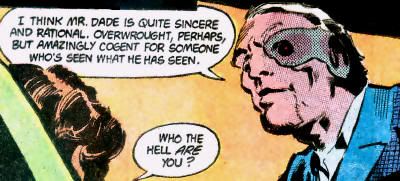
"Home, my son, is not a place. It is a feeling. It is a gathering of hearts that give comfort. It is heaven on earth." --from the teachings of Rahani

"If you want the wife to watch,
it'll cost extra."

"I know just the place."

"Happy
Women's
History
Month!"


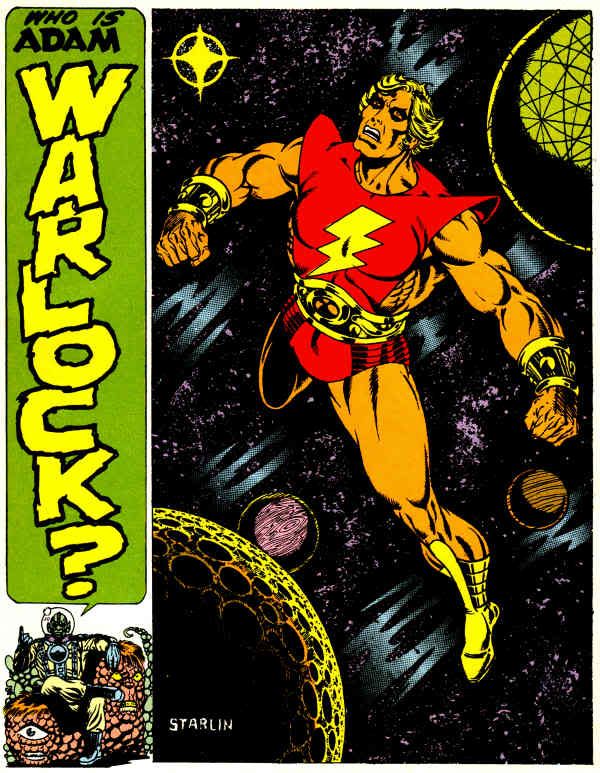

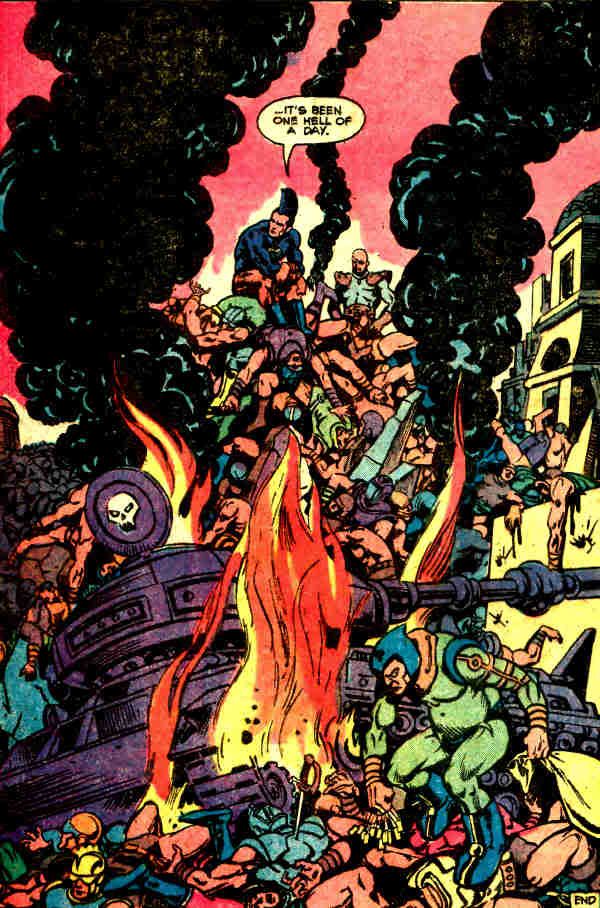

"What
kind of
candy?"

"Hey, kids-
Mommy
and Daddy
don't really
love you."

"I had it all.
And I blew it."


"You can't just pretend nothing happened."


"Project X involves the disruption of physical reality... the merging of this reality-plane with that of the netherworld. Bork and his fellow renegades of the Black Council have discovered a weakening of the cosmic fabric here in this locus... on the world you call Earth. A similar, parallel weakening is taking place on the planet Rann, of the star-system Alpha Centauri.
Bork has developed a device known as the Probability Disruptor, which feeds on red sun radiation, relayed to this world from a base on Earth's satellite, Luna. The Disruptor is destroying the protective barrier between realities at this locus. The result is an increase in the manifestation of demons on Earth... manifestations that occur normally at this locus, at periodic intervals related to phases of the moon. Bork's disruptor, however, has increased the number of manifestations a thousandfold.
Project X is upsetting the natural cosmic balance... a balance we of Molanto have worked long and hard to maintain. To save reality, Molanto, in conjunction with the Greater Galaxies organization, have invaded Earth. We have done this for the simple reason of expedience. Bork must be found. Project X must be halted. The fastest, simplest way to accomplish this is through the conquest of Earth."
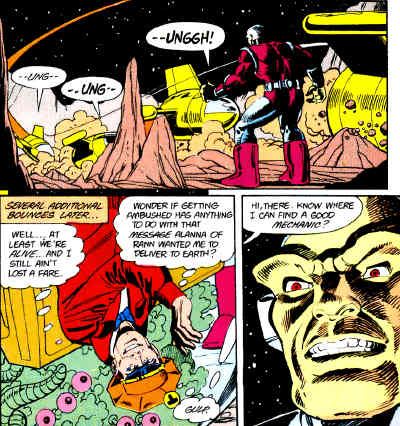
OUR COVERS: Manhunter From Mars by Al Milgrom, back again and probably slated to appear in DETECTIVE, and two new additions to ADVENTURE, Power Girl and The Huntress by Rick Taylor. ©1978 DC Comics Inc.
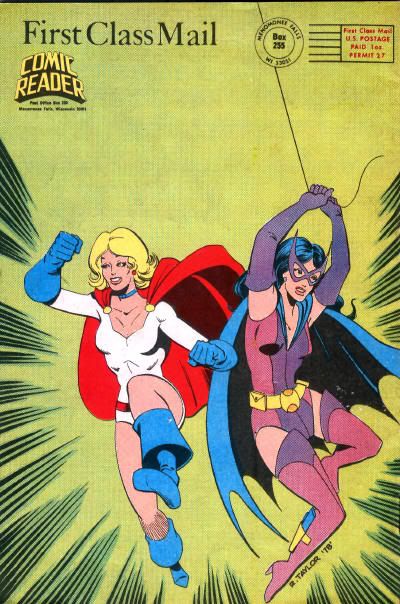
DC
NEWS
What happened on June 22, 1978 may possibly be the most significant events of the year. This is undoubtedly the most complicated story we've ever had to report, and the ramifications from it will be felt for the foreseeable future if not beyond. It started ten years ago when Warner Brothers took over Kinney National Service, which owned DC Comics.
The corporate heads of Warner Communications had stayed pretty much out of the picture as far as creative decisions go, the significant actions being the instatements of Carmine Infantino and Jenette Kahn as publishers and the budget and price increase okays over the years. Recently, however, the people upstairs began to take long looks at the downward trend sales have taken since they inherited their branch of the comics industry and a decision was made to attempt to halt the plummet by some drastic means. The first of these we mentioned last issue, which involves massive overhaul of the distribution process. Basically, this involves getting a much greater percentage of the copies that are printed displayed on the nation's newsstands, working more closely with local distributors and wholesalers. We will only be able to see the results of this step since few of us are wholesalers. The second step they have taken will hit much more closely to home and we will all feel its impact.
DC has eliminated their shortlived 50¢, 40 page line, after only three months' trial. Obviously, the reason has nothing to do with sales. The people at Warner feel that the new system of distribution should be given a chance with DCs looking like the rest of the industry's books, since there will be some risk of alienating wholesalers without the more expensive books. So, beginning in September (books cover dated December), all DCs that are not dollar books will be 32 pages with 17 pages of story again, but now for 40¢. And that's not all.
All non-dollar-sized bi-monthly books have either been cancelled or upgraded to monthly status. Hereafter, only monthly titles will be published in the regular size.
DC's Mike Gold feels that the delay of the SUPERMAN film had nothing whatsoever to do with the decision. His opinion is that the decision came as a result of fifteen years of declining comic sales, possibly spurred on by the low winter sales (figures seriously out of wack because of the blizzard), and the new size would not have been saved even if a phenomenal sales push had been garnered from the film.
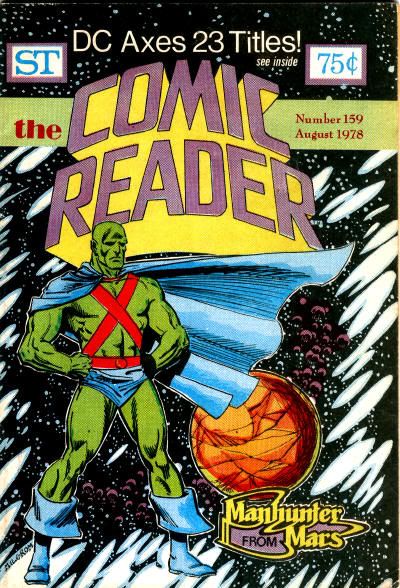

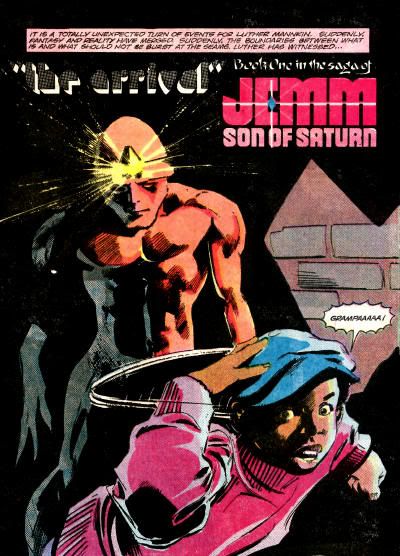
"Remember, my prince, that in the tiniest of seedlings rests the promise of renewed life-- and hope! Nothing is more precious than this! It is the reason why even the most vile men remain not untouched at the vision of a child!"
--from the teachings of Rahani


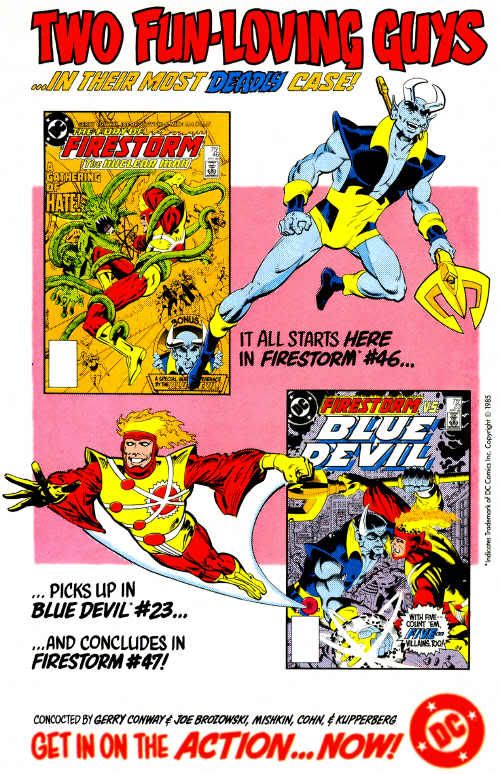
TWO FUN-LOVING GUYS ... In Their Own Deadly Case! It all starts here in Firestorm #46... picks up in Blue Devil #23... and concludes in Firestorm #47! Concocted by Gerry Conway & Joe Brozowski, Mishkin, Cohn, & Kupperberg! Get in on the action... NOW!
